Bmp antagonist - Study guides, Class notes & Summaries
Looking for the best study guides, study notes and summaries about Bmp antagonist? On this page you'll find 73 study documents about Bmp antagonist.
Page 3 out of 73 results
Sort by
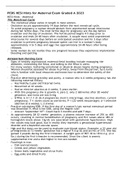
-
PEDS HESI Hints for Maternal Exam Graded A 2023
- Other • 11 pages • 2023
-
Available in package deal
-
- $11.00
- + learn more
HESI Hints – Maternal The Menstraul Cycle • The menstrual phase varies in length in most women. • Ovulation occurs approximately 14 days before the next menstrual cycle. • To avoid pregnancy a woman should abstain from unprotected sexual intercourse during her fertile days. The most fertile days for pregnancy are the day before ovulation and the day of ovulation. The fertile period begins 4-5 days prior to ovulation and ends 24-48 hours after ovulation. A couple must avoid unprotect...

-
20222023 ATI PHARMACOLOGY PROCTORED EXAM -STUDY GUIDE 100% CORRECT
- Exam (elaborations) • 35 pages • 2022
-
- $15.49
- + learn more
ATI PHARMACOLOGY 2019 PROCTORED EXAM -STUDY GUIDE 1. When administering the drug senna to a patient, a health care provider must inform the patient of which of the following When giving digoxin (Lanoxin) to a patient, the health care provider notices various signs and symptoms of an overdose. The health care provider knows to give which of the following to reverse digoxin toxicity 3. While providing an Angiotensin-converting enzyme (ACE) inhibitor, the patient asks what the action of the drug is...
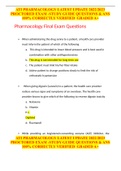
-
Pharmacology final exam questions (UPDATED) ///Pharmacology final exam questions (UPDATED) ///
- Exam (elaborations) • 107 pages • 2023
-
- $15.99
- + learn more
Pharmacology Final Exam Questions • When administering the drug senna to a patient, a health care provider must inform the patient of which of the following a. This drug is intended to lower blood pressure and is best used in combination with other antihypertensives b. This drug is not intended for long term use c. The patient must limit his/her fiber intake d. Advise patient to change positions slowly to limit the risk of orthostatic hypotension • When giving digoxin (Lanoxin) t...
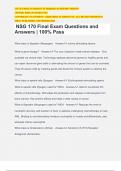
-
NSG 170 Final Exam Questions and Answers | 100% Pass
- Exam (elaborations) • 39 pages • 2024
-
- $12.49
- + learn more
NSG 170 Final Exam Questions and Answers | 100% Pass What class is filgrastim (Neupogen) - Answer️️ -colony stimulating factors What is gene therapy? - Answer️️ -The use of genes to treat/ prevent disease . Only available via clinical trials. Technology replaces abnormal genes for healthy genes and can repair abnormal gene cells or alternating the amount of genes that can be activated. They kill cancer cells by inserting genes that boost the immune system to destroy the cancer. W...
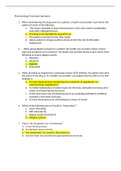
-
Pharmacology Final Exam Questions
- Exam (elaborations) • 43 pages • 2022
-
- $15.49
- + learn more
Pharmacology Final Exam Questions Pharmacology Final Exam Questions 1. When administering the drug senna to a patient, a health care provider must inform the patient of which of the following a. This drug is intended to lower blood pressure and is best used in combination with other antihypertensives b. This drug is not intended for long term use c. The patient must limit his/her fiber intake d. Advise patient to change positions slowly to limit the risk of orthostatic hypotension ...

-
NR601 Final Exam
- Exam (elaborations) • 7 pages • 2023
-
- $7.49
- + learn more
NR601 Final Exam Diabetes Diagnostic criteria - CORRECT ANSWER-- 2 fasting BS > 126 -Random BS >200 if sx of DM present - A1C > 6.5 x2 - 2 hour plasma glucose (OGTT) >200 - Prediabetes 5.7-6.4 A1C Initial Tx of DM - CORRECT ANSWER-- Type 1: usually need hospitalization d/t being in crisis, endocrinology, daily basal & prandial insulin -Type 2: A1C <7.5: Nutritional therapy, physical activity, weight loss, monotherapy (usually metformin). >7.5 @ diagnosis or after 3...
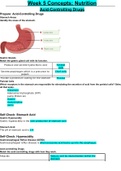
-
NR 293 Week 5 Concepts; Nutrition
- Exam (elaborations) • 73 pages • 2023
- Available in package deal
-
- $45.49
- + learn more
Prepare: Acid-Controlling Drugs Stomach Areas • Identify the areas of the stomach. Gastric Glands • Match the gastric gland cell with its function. Parietal Cells • Which receptors in the stomach are responsible for stimulating the secretion of acid from the parietal cells? Select all that apply. Self-Check: Stomach Acid Gastric Hyperacidity • Gastric hyperacidity is the over production of stomach acid. Stomach Acid • The pH of stomach acid is 1-4. Self-Check: Hyperacid...
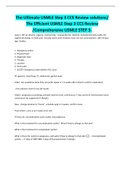
-
The Ultimate USMLE Step 3 CCS Review solutions/ The Efficient USMLE Step 3 CCS Review /Comprehensive USMLE STEP 3.
- Other • 332 pages • 2022
-
- $16.49
- + learn more
The Ultimate USMLE Step 3 CCS Review solutions/ The Efficient USMLE Step 3 CCS Review /Comprehensive USMLE STEP 3. Case 1: 25F w/ dysuria, urgency, and burning, + suprapubic ttp. Afebrile, hemodynamically stable. No vaginal discharge, no flank pain. Sexually active with husband, does not use contraception. LMP 24 days ago. Smoker. 1. Emergency orders 2. Physical Exam 3. Diagnostic tests 4. Therapy 5. Location 6. Final order 7. Dx - Emergency orders (before PE): none PE: general, c...
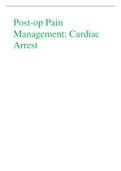
-
Post-op Pain Management: Cardiac Arrest
- Exam (elaborations) • 21 pages • 2022
-
- $15.49
- + learn more
Post-op Pain Management: Cardiac Arrest Post-op Pain Management: Cardiac Arrest (2/2) Sheila Dalton, 52 years old Primary Concept Perfusion Interrelated Concepts (In order of emphasis) 1. Gas Exchange 2. Acid-Base Balance 3. Fluid and Electrolyte Balance 4. Clinical Judgment 5. Patient Education 6. Communication 7. Collaboration © 2016 Keith Rischer/www.KeithRN.com UNFOLDING Reasoning Case Study: STUDENT Post-op Pain Management 2/2: Cardiac Arrest History of Present Problem...
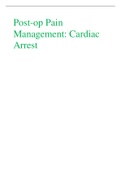
-
Post-op Pain Management: Cardiac Arrest
- Exam (elaborations) • 21 pages • 2022
-
- $13.49
- + learn more
Post-op Pain Management: Cardiac Arrest Post-op Pain Management: Cardiac Arrest (2/2) Sheila Dalton, 52 years old Primary Concept Perfusion Interrelated Concepts (In order of emphasis) 1. Gas Exchange 2. Acid-Base Balance 3. Fluid and Electrolyte Balance 4. Clinical Judgment 5. Patient Education 6. Communication 7. Collaboration © 2016 Keith Rischer/www.KeithRN.com UNFOLDING Reasoning Case Study: STUDENT Post-op Pain Management 2/2: Cardiac Arrest History of Present Problem...

Do you wonder why so many students wear nice clothes, have money to spare and enjoy tons of free time? Well, they sell on Stuvia! Imagine your study notes being downloaded a dozen times for $15 each. Every. Single. Day. Discover all about earning on Stuvia


